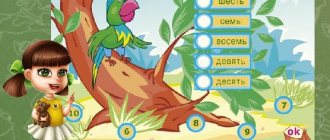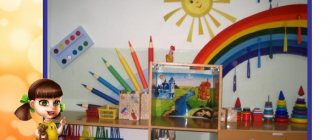Computer educational games for preschool children article on computer science on the topic
Slide 1
Computer didactic games in mathematics for preschool children The presentation was made by: 3rd year student of group DO Z - 432 of the Faculty of PiMDNiDO Shutko Veronika
Slide 2
A pronounced trend in the development of modern society is its informatization, accompanied by an increasingly widespread and intensive introduction of information technologies into various spheres of human activity. Just three decades ago, it seemed that the computer was a complex and mysterious device of the distant future, accessible only to a select few. And today, thanks to its versatility, it is useful to a person of any profession. It is the versatility of computer tools that determines their developmental effect in education. Introduction
Slide 3
The computer can be used not only as a practical aid in computer science lessons, but also as a means of expanding the capabilities of the educational process in all educational institutions from kindergarten to school. Children's interest in computers is enormous, and it is up to adults to create conditions for its maintenance and expansion in order to develop and improve the child's cognitive abilities.
Slide 4
If you have poor eyesight, you can only use glasses to use a computer; Maintain a distance from the eyes to the screen (50-70 cm); Take breaks from work and do eye exercises every 10-25 minutes of working in front of the monitor; Maintain correct working posture; Do not work on the computer in the dark; Monitor the content of games and programs; After exercise, wash with cool water. 7 basic rules when a child works at the computer
Slide 5
Computer games are special computer programs that display a picture on the screen, thereby turning this screen into a game field. It's a kind of "board game", but an impressive one and quite challenging. The truly gigantic number of games, the range of which is updated almost monthly (if not weekly), can confuse any of us. And knowledge of the genre classification of games will help us in this matter. Conventionally, the entire variety of computer games can be classified as follows: Games for preschoolers
Slide 6
Arcade games (arcades) are the most popular children's flash games with a fairly simple game plot. Children need to react quickly enough to changing situations. Children play, earn points, and gradually move to new levels. If a child completes the levels within the prescribed period, he will be awarded bonuses in the form of points, weapons and other options for completing them. Also, a young player, if he successfully completes all levels, gets into the gallery of the best participants in the game, where he can enter his own name. Arcades develop the speed of the thought process and reaction. Arcade games
Slide 7
Creative games include numerous educational computer games in which the child needs to complete all sorts of creative tasks: decorate objects, find several identical objects, find several differences between two seemingly identical pictures, and solve other interesting tasks. Such games provide an opportunity to reveal a child’s creative potential at a very early age. Programmers from the most famous software companies are working on new games. Creative games
Slide 8
In games of this genre, the player has at his disposal a small squad of characters, each of whom performs their own separate role or function. The goal of the heroes is to work together to explore the virtual world and complete the task. The task may be to find a specific treasure, treasure or spell. The path to achieving the intended goal is usually blocked by various obstacles and pests of various stripes, which must be overcome by force or cunning. This is where the main principle of a role-playing game comes into play - using the right character at the right time and in the right place. Role-playing games
Slide 9
The quest genre involves performing significant mental tasks during the game. Through logical thinking, the child plays out certain game situations. In order to successfully perform mental work, a child must concentrate and remember basic mathematical rules: multiplication, addition, subtraction, division. By alternately completing the appropriate tasks as the game progresses, the child gradually moves towards the end of the game, where bonuses or an interesting cartoon await him for successfully completing the game. Quests
Slide 10
Most children of older preschool age are interested in puzzles, if, of course, they are accessible to them. The usefulness of logic games is that they develop logical thinking skills. Most often, such a game is a single task or a set of several puzzles that need to be solved. Typical representatives of this genre are various tasks involving rearranging figures or composing a picture. Recently, Russian manufacturing companies have been producing many high-quality, varied logic games designed for preschool age, with the goal of teaching children counting, reading, writing and other subjects. brain teaser
Slide 11
developing the child’s logical thinking and memory; improving coordination of movements (fine motor skills); developing numeracy and reading skills; developing imagination and three-dimensional perception; developing the child's artistic taste and musical ear. There is also another classification of children's games:
Slide 12
preparation for school; the child, controlling the educational game program, begins to think first and then act; involvement in research work; the child’s social adaptation to school, his relationships with future classmates. How computer games can help:
Slide 13
Games for preschoolers: what to look for? Why is it important? Is the selected game suitable for age requirements? It is possible that games for preschoolers 5-6 years old may be suitable for a 4-year-old child - and vice versa. Try to review the game yourself before recommending it to your child. What skills and abilities will this game contribute to the development of preschoolers? Games for preschoolers can contribute to the development of fine motor skills, observation, and eye; logical, spatial, creative thinking. At the same time, the graphic and musical design of games for the development of preschoolers can be in no way inferior to computer “entertainment” games. Will the child be able to play this game with other children? Online children's games usually include multiplayer play and socializing features. How long will the chosen game be relevant for the child? Children's curiosity needs constant feeding. But educational games installed on a computer do not update themselves. In children's online games, new educational games for preschoolers are usually added by the developers themselves.
Slide 14
Purpose of the game: -to strengthen counting skills within 10 in children aged 5-7 years; -develop the ability to establish a correspondence between the number of objects and numbers; - develop attention. Progress of the game: An adult asks the child: “Name the fairy-tale characters. What fairy tale (cartoon) are they from?” Introduce children to the game task: “Count the fairy-tale characters and find the number that corresponds to their number. Click on the number. If you find the number correctly, it will move to the square with a question mark, which is located next to the fairy-tale characters. Click on the arrow to go to the next slide." Interactive game for preschoolers “Find the number” (5-7 years old)
Slide 15
Purpose of the game: - consolidate knowledge about geometric shapes: circle, square, triangle, rectangle, oval; -clarify children’s ideas about color; - develop observation and attention. Progress of the game: Read the poem to the children: Master, master, Help - The boots are leaky. Hammer the nails harder - We'll go visit you today! B. Zakhoder Introduce the game task: “Help the master fix his leaky boots. Choose your own patch for each boot. To do this, click on the patch, which is shaped like a hole in a boot. Be careful!" Interactive game for preschoolers 4-6 years old “Pick up a patch”
Slide 16
children can already complete tasks consisting of several stages; children already know how to concentrate on a task that interests them; Children’s hand motor skills are already well developed; children already have certain ideas about the world around them: people, animals, natural phenomena. When organizing classes for the preschool development of a child aged 5-6 years, it is worth considering that usually at this age... children can already write numbers and letters; children are already able to tell stories and poems expressively; children are already well oriented in space and time; Children already know a little how to classify objects, their eye and observation skills are actively developing. When organizing classes for the preschool development of a child aged 4-5 years, it is worth considering that usually at this age...
Slide 17
Goal: Development of logical thinking, attention, memory. This game will help preschoolers learn to reason and draw conclusions. Because it is important not only what the child chooses, but also how he explains his decision. Progress of the game: Guys, now you will see four cards with objects drawn on them. Three objects can be combined according to some characteristic, for example, shape or color. And one of them does not have this characteristic and is superfluous. In this game you need to find a card with an extra item and explain your choice. By clicking the mouse, the next slide will show a picture with the correct answer. Didactic game "Fourth odd". Logic and thinking game
Slide 18
The use of computer games in pedagogical practice is a way to improve the entire pedagogical process, increase the child’s education, it helps in diagnosing development, solving problems of correctional and developmental education, developing children’s initiative and curiosity; expanding the possibilities of creating elements of a developmental environment, expanding the possibility of implementing an individually differentiated approach to the child and creating a positive emotional background. Conclusion
Are computer games useful?
In order to help the child develop, the parent must always be there. So you can’t just turn on your tablet or PC, sit your child in front of it and go about your business for hours. And in case of failure, always criticize the World Wide Web. No, things are a little different. It is important to choose the right games that will help you develop, and you should not forget about parental control so that your child does not accidentally see something forbidden.
Special studies were carried out, from which the following conclusions were made:
- a child who plays computer games becomes more attentive and focused in life, which helps in the future while studying - to listen and remember more information;
- various puzzles, quests and other tasks develop logic and the ability to multitask;
- fine motor skills return to normal thanks to working with the keyboard and manipulator;
- with each new level, the child learns to analyze its complexity, and then this will help to correctly assess his opportunities in life, which, in turn, will also help in self-development;
- to relieve some nervous tension, you can choose games with elements of restrained aggression, but parents should pay more attention to them, and first choose them yourself;
- in a computer game there are no restrictions for fantasies and even for actions; this helps in developing one’s horizons and knowledge of the world around us.
Of course, there are also negative sides to computer games, since everything cannot be so bright and beautiful. Sitting in front of a PC for long periods of time puts a lot of strain on your eyes. And sometimes the child does not want to do anything else. In the game he is forgotten and disconnected from reality, which in turn minimizes contacts with people.
But, all these disadvantages can be easily smoothed out by parents if they monitor their child, and not just turn on the tablet for him, every time just so that he “does not get in the way.” In addition, there are many different computer entertainments where parents can play with their child.
Games for children are divided into categories depending on the topic and focus.
And if we talk about children of preschool or school age, then there is a list of the best computer games for development.






